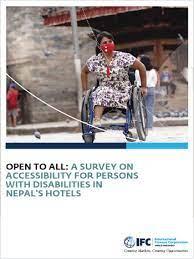
IFC Study: Promoting Accessible Tourism Can Help Nepal Drive Sector Recovery, Boost Economy
Open to All: A Survey On Accessibility for Persons With Disabilities In Nepal's Hotels (ifc.org)
The report—Open to All: A Survey on Accessibility for Persons with Disabilities in Nepal’s Hotels—covers 90 starred hotels in major cities. While 95 percent of the participating hoteliers are aware of accessible tourism as a concept, they have not invested in necessary measures to ensure accessibility for persons with disabilities.
With existing facilities limited to ramps and lifts in most hotels, only 17 percent of the surveyed hotels put up signs to help visually-impaired guests and 74 percent of the hotels did not have any Braille signage on door plaques and room directories, according to the survey. Further, only about 9 percent of the hotels had staff who were trained in or had basic knowledge of sign language while only 33 percent of the participating hotels had extra wheelchairs for guests.
The poor numbers were attributed to a range of factors including old structures, remote locations, and fewer guests with disabilities. Many of the surveyed hotels also cited extra cost as a key deterrent to building ramps, purchasing wheelchairs, or providing other accessible infrastructure and services.
"Globally, the concept of accessible or inclusive tourism has gained ground in recent times. Accessibility at tourism destinations is key to responsible and sustainable tourism to ensure everyone can be part of the tourism experience, regardless of physical limitations, disabilities, or age," said Wendy Werner, IFC Country Manager for Nepal, Bangladesh, and Bhutan. "Accessible tourism is not only a human right, it also makes business sense."
According to the World Health Organization, globally, around one billion people are affected by some form of disability. According to disability rights experts in Nepal, as more persons with physical limitations and disabilities travel around the world, a focus on accessible infrastructure in hotels as well as tourism destinations can boost the number of foreign tourists in the country.
"Currently, around 2,000 tourists with disabilities visit Nepal every year," said President of the National Federation of the Disabled–Nepal, Mitra Lal Sharma. "But, with improved facilities and conditions that are more disability-friendly, the number could easily go up to over 10,000 tourists a year."
"Although accessible tourism is relatively new in Nepal, we are confident that with adequate support, we can push ourselves to explore and attract this growing segment of tourists to our country," said President of Hotel Association of Nepal, Shreejana Rana.
The study recommends, going forward, the government, the private sector, and donor agencies will need to work together to create a conducive environment by incorporating universal accessibility practices into relevant legal and policy provisions, with the involvement of persons with disabilities.
The study was conducted by the Society of Economic Journalists–Nepal, in collaboration with the National Federation of the Disabled–Nepal, with financial and technical assistance from IFC.
For the full report, please click here
About IFC
IFC—a member of the World Bank Group—is the largest global development institution focused on the private sector in emerging markets. We work in more than 100 countries, using our capital, expertise, and influence to create markets and opportunities in developing countries. In fiscal year 2021, IFC committed a record $31.5 billion to private companies and financial institutions in developing countries, leveraging the power of the private sector to end extreme poverty and boost shared prosperity as economies grapple with the impacts of the COVID-19 pandemic. For more information, visit www.ifc.org.










Add new comment